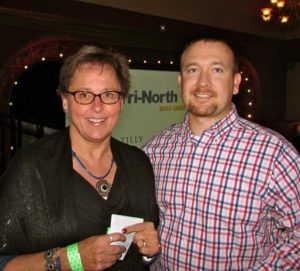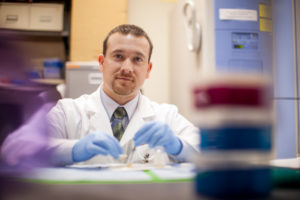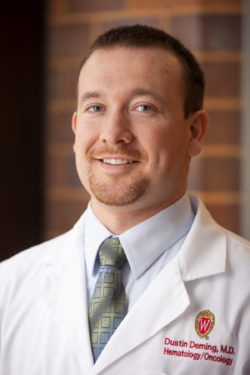May 31, 2017:
Dustin Deming, MD, is a gastrointestinal oncologist at the University of Wisconsin Carbone Cancer Center (UWCCC) and the William S. Middleton Veterans Hospital with subspecialties in the treatment of colon, rectal, and anal cancers.
Deming’s commitment to the field is no coincidence; his first-hand exposure to clinical oncology opened his eyes to opportunities to apply his lab science strengths. “I had thought I wanted to be a pathologist and focus mostly on basic science research, because I had kind of been a lab rat for the beginning portion of my career. Once I actually got into the clinic, I realized how exciting it was to be involved in many aspects of colorectal research: things as basic as drug discovery, or target-finding through early phase clinical trials and national phase two and phase three trials, and seeing patients in the clinic,” he said. “It has been really rewarding, because, I think, in each aspect, experience in the lab and experience in the clinic can really feed into each other.”
Deming’s clinical experience took a personal turn just two weeks into his appointment at the University of Wisconsin, when he became a cancer patient himself. “I accepted a faculty position after completing a post-doc here at the University of Wisconsin, and two weeks later was diagnosed with stage three rectal cancer. I underwent chemotherapy, radiation, surgery – about eight months of treatment – and, thankfully, have been cancer free ever since,” he recalls. “That was four and half years ago.”
Deming’s diagnosis came early in his career, at a much younger age than most people diagnosed with rectal cancer. “Most people diagnosed with colon or rectal cancer get it in their late 60s, early 70s. But there is a rising trend in people being younger,” he said. Furthermore, as for many such young people, the root cause was not readily known. “I have had genetic testing and there is no known hereditary reason for me to get it so young; no family history, no one in my family at all had cancer, that we are aware of.”
Deming regards his battle with profound perspective. “As much as I would never wish cancer on anybody, in a lot of ways, it has kind of been a blessing to me,” he said. “In the clinic, I can look my patients in the eye and tell them I have been there. I have had the surgery you are about to have. I know what it is like to have a permanent ostomy because I have one too. I can tell you what FOLFOX feels like, the neuropathy and things that go along with that. I can empathize with my patients to a much greater extent that I ever had before. From the research side, I now better understand the urgency: better treatment, should my cancer come back, should my kids be at increased risk for this, you know … I get it. I know that if an experiment can wait until next week, that does not mean it should wait until next week, because the things we are developing in the lab and our work in the clinic are the future. This means a lot for a lot of patients. To be diagnosed at such a young age has really given me a motivation above and beyond whatever I would have had.”

Dr. Deming with his patient, Cathy Wingert. Read her inspiring story: here.
His motivation is contributing to cutting-edge research at UWCCC. “Our interests are two-fold: precision medicine and immunotherapies,” Deming said. “From an immunotherapy standpoint, we are investigating how the tumor microenvironment can lead to enhanced immune regulation. Working with another lab here, we are looking at different factors that may prevent colon cancers from being recognized by the immune system. From a precision medicine standpoint, we have been focusing on colon cancers that have PIK3CA mutations, identifying a new treatment strategy for that particular subtype of colon cancer.”
A by Deming’s research team at UWCCC, recently made the cover of Molecular Cancer Research. “Colon cancers with APC and PIK3CA mutations have been very challenging to target with kinase inhibitors, and what we found was that dual targeting with PI3K and mTOR inhibition has led to great responses, at least in our models. So, that is a strategy that we hope to bring into clinical trials,” Deming said.
“We are also trying to find what therapies are already out there that could work for the right population,” he said. “There are over 300 drugs that are either approved or in active clinical development; the big problem is, we do not know who is the best patient for the vast majority of these drugs. So, what our lab hopes to do is to identify populations of patients that are more likely than others to respond to therapies that are already in development. That way, things can go fast from the lab to the clinic. We are looking a lot at the mutation profiles of tumors and how that changes the response to precision medicine therapies. More recently, with the excitement about immunotherapies, a big goal of ours is to find an additional population beyond the mismatch repair-deficient population that will respond to immunotherapies in colon cancer.”
Deming is a member of the Big Ten Cancer Research Consortium’s Gastrointestinal Clinical Trial

Dr. Dustin Deming, photo by John Maniaci
Working Group and the junior investigator working with Dr. Bert O’Neil on the Big Ten CRC hepatocellular carcinoma study. He finds the working group fertile ground for ideas. “The GI working group is a great place to bring clinical trials forward,” he said, adding that the group played a significant role in refining the concept of the hepatocellular study. “The working group is where I started talking about our abilities to do the correlative work. The working group is where we discussed how many patients we can enroll, what the feasibility is, what the timeframe is, and how people are treating this patient population. The working groups are absolutely critical in making these studies happen.”
Deming has found involvement in the GI working group to be personally enriching. “I really enjoy going to the meetings and being on the phone calls; we discuss clinical trials. It is great for networking, but is also great for sharing experiences in clinical trial development,” he said.
Deming translates his observations about the Big Ten CRC into encouragement for his peers. “The nice thing about this GI working group is that it is a very supportive environment,” he said. “It is a great place for young investigators to come and have concepts reviewed in a very nonjudgmental way. Simple things like emailing concepts through the headquarters and group, getting a large amount of feedback, participating in calls, and coming to the face-to-face meetings are great ways to get involved and get your name out there.”
Involvement in the consortium has been a benefit to Deming’s lab as well. “We do mostly our own mouse modeling and patient-derived culturing, but when it comes time to translate these to the clinic, that is where the Big Ten CRC is absolutely critical,” he said. “We have taken advantage of the ability to take our lab’s experience in the PI3K pathway and apply that to the Big Ten CRC hepatocellular carcinoma study developed by Dr. Bert O’Neil. Because of our lab’s experience with this pathway, we are generating the correlative data for this trial. It is a way of taking our lab experience and applying it in a greater extent to these clinical trials.”
Deming’s perspective on the urgency of research demands of a consortium what it demands of himself: efficiency. He has found it in the Big Ten CRC. “The nice thing about the Big Ten CRC is having centralized contracting, centralized budgeting, and being able to do things in an efficient manner,” Deming said.
Deming also appreciates the role of mentorship within the Big Ten CRC in building a strong research collaboration. “I think that it is really critical for junior investigators to have senior PI mentorships,” he said. “For many junior investigators, it is the first time they are participating in Phase II clinical trials. The Big Ten CRC is a great way for the junior investigators to get that mentorship and get their name out there. For the senior PIs, it is rewarding to pass the knowledge to the next generation and see these clinical trials happen.”
Learn more about opportunities available to investigators within the Big Ten CRC.
About the Big Ten Cancer Research Consortium: The Big Ten Cancer Research Consortium was created in 2013 to transform the conduct of cancer research through collaborative, hypothesis-driven, highly translational oncology trials that leverage the scientific and clinical expertise of Big Ten universities. The goal of the Big Ten Cancer Research Consortium is to create a unique team-research culture to drive science rapidly from ideas to new approaches to cancer treatment. Within this innovative environment, today’s research leaders collaborate with and mentor the research leaders of tomorrow with the unified goal of improving the lives of all patients with cancer.
About the Big Ten Conference: The Big Ten Conference is an association of world-class universities whose member institutions share a common mission of research, graduate, professional and undergraduate teaching and public service. Founded in 1896, the Big Ten has sustained a comprehensive set of shared practices and policies that enforce the priority of academics in the lives of students competing in intercollegiate athletics and emphasize the values of integrity, fairness and competitiveness. The broad-based programs of the 14 Big Ten institutions will provide over $200 million in direct financial support to almost 9,500 students for more than 11,000 participation opportunities on 350 teams in 42 different sports. The Big Ten sponsors 28 official conference sports, 14 for men and 14 for women, including the addition of men’s ice hockey and men’s and women’s lacrosse since 2013. For more information, visit www.bigten.org.















Subscribe to the Big Ten CRC Newsletter X
X Facebook
Facebook YouTube
YouTube